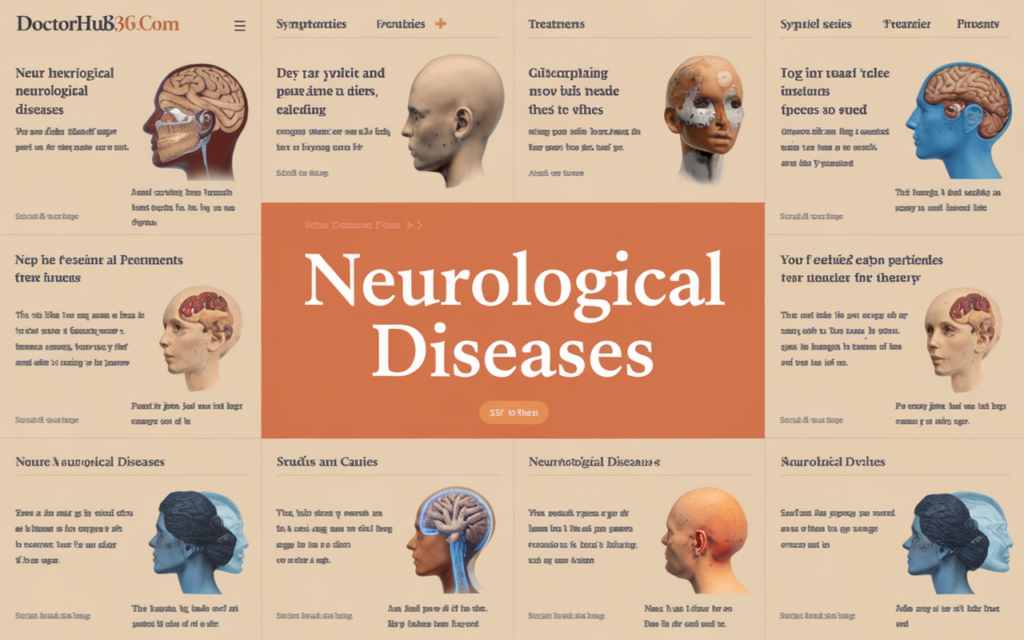Neurological diseases can affect anyone—at any age, in any place. In the United States, millions of people experience symptoms tied to problems in the brain, spinal cord, or nerves. It can be confusing and even scary when something goes wrong with these parts of your body. That’s where DoctorHub360.com comes in. This trusted health platform makes it easy to understand complex medical conditions, especially those that affect the nervous system. With simple explanations, expert-backed information, and patient-first content, DoctorHub360.com helps people find answers, get support, and take better care of their brain and nervous system.
What Are Neurological Diseases?
Neurological diseases are medical conditions that affect the nervous system, which includes your brain, spinal cord, and nerves. These diseases can impact how your body moves, how you feel, how you think, and how your internal systems function.
Just imagine the nervous system as your body’s electrical wiring. The brain is the control center, sending out messages through the spinal cord and nerves. When something interrupts those signals—like damage, inflammation, or faulty wiring—it can cause a wide range of symptoms. You might feel dizzy, have muscle weakness, experience seizures, or forget things more often.
Some neurological diseases are chronic (they last a long time), while others might come on suddenly or be caused by injury or infection. According to DoctorHub360.com, it’s important to catch symptoms early, because early treatment can help prevent further damage and improve quality of life.
Why the Brain and Nerves Matter So Much
Your brain and nerves control everything—from how you move and breathe to how you speak and solve problems. The nervous system is like the internet of your body, sending signals between your brain and all your body parts at lightning speed.
Even small disruptions can have serious effects. A blocked blood vessel in the brain can cause a stroke. A problem with nerve signals can make it hard to walk or talk. A simple imbalance in brain chemicals can lead to mood changes or seizures. That’s why it’s crucial to understand how these systems work and what happens when they break down.
DoctorHub360.com explains these ideas in easy-to-read guides and helps patients understand why brain health isn’t just important—it’s essential to everyday life.
Common Neurological Diseases Explained Simply
There are hundreds of neurological conditions, but some are much more common than others. Understanding the basics of these diseases can help you recognize symptoms and seek help early. DoctorHub360.com focuses on making these diseases understands

ble, with real-life examples and guidance.
Epilepsy – When the Brain’s Messages Get Mixed Up
Epilepsy is a condition that causes seizures, which are sudden bursts of electrical activity in the brain. Seizures can look different in each person—some people shake uncontrollably, while others may just stare blankly or twitch slightly.
This happens when the brain’s messages don’t fire correctly, like a power surge in your home’s electrical system. Epilepsy can start in childhood or adulthood and may be linked to genetics, head injuries, or unknown causes.
With medications, lifestyle changes, and regular care, many people with epilepsy live full, active lives. DoctorHub360.com provides up-to-date treatment info, seizure safety tips, and support resources.
Migraines – Not Just a Bad Headache
Migraines are more than just painful headaches. They’re a type of neurological disorder that can come with nausea, light sensitivity, vision problems, and even speech issues. Migraines can last for hours—or even days—and affect one in every seven people.
Many migraine sufferers experience a warning signal called an aura, which might include flashing lights or numbness in the body. Triggers like stress, certain foods, and hormonal changes can cause migraines to start.
DoctorHub360.com breaks down the science of migraines in simple language and offers tips for finding relief, managing triggers, and knowing when to see a doctor.
Parkinson’s – When Movements Get Slower
Parkinson’s disease is a neurological condition that affects movement. It’s caused by a loss of brain cells that produce dopamine, a chemical that helps control smooth muscle movements. Without enough dopamine, people may shake, move slowly, or feel stiff and unbalanced.
Parkinson’s often starts with small symptoms, like a trembling hand or soft voice. Over time, it can affect walking, writing, facial expressions, and more.
There’s no cure yet, but medications, physical therapy, and newer treatments like deep brain stimulation can make a huge difference. DoctorHub360.com helps patients understand the early signs and manage life with Parkinson’s step-by-step.
Signs Something Might Be Wrong
Your body often gives you clues when something isn’t working right. The trick is knowing what to look for. Here are some early warning signs of neurological issues:
- Frequent or severe headaches
- Memory problems or confusion
- Muscle weakness or stiffness
- Unexplained numbness or tingling
- Vision or speech changes
- Shaking or tremors
- Problems with balance or walking
- Seizures or fainting spells
These signs can show up slowly or suddenly, and they’re always worth checking out. DoctorHub360.com has detailed symptom checklists to help you know when to call your doctor.
What Causes These Problems?
Neurological diseases can have many different causes, and sometimes, the exact reason is never found. But most causes fall into a few main categories:
- Genetic conditions – Some neurological disorders are inherited, like Huntington’s disease.
- Injuries – A head injury, car accident, or fall can damage the brain or spinal cord.
- Infections – Diseases like meningitis and encephalitis affect the brain directly.
- Autoimmune diseases – Conditions like multiple sclerosis cause the immune system to attack nerves.
- Stroke – A sudden loss of blood flow to the brain.
- Tumors – Both cancerous and non-cancerous growths can press on parts of the nervous system.
- Lifestyle factors – Poor diet, lack of sleep, substance abuse, and stress all contribute.
DoctorHub360.com discusses each of these causes with helpful illustrations and expert insights so users can take control of their health.
How Doctors Find Out What’s Wrong
Diagnosing a neurological disease isn’t always easy. It often takes a combination of tools, tests, and medical history. But thanks to modern technology, doctors can now look deeper into the nervous system than ever before.

Brain Scans
Imaging tests like MRI (Magnetic Resonance Imaging) and CT scans give doctors a clear picture of your brain. These scans can spot tumors, injuries, strokes, and even inflammation. DoctorHub360.com explains what each type of scan does, how it feels, and what to expect.
Reflex Tests
Doctors may also check your reflexes to see how your nerves respond to stimuli. Reflex tests are simple but can reveal serious problems. For example, slow reflexes might signal nerve damage or spinal cord injury.
Can Neurological Diseases Be Treated?
Yes—many neurological conditions are treatable, especially if caught early. Treatments depend on the disease, but common options include:
- Medications – Used to manage symptoms, control seizures, boost brain chemicals, or reduce inflammation.
- Therapy – Physical, occupational, and speech therapy can help with movement, strength, and communication.
- Surgery – In some cases, doctors may remove a tumor or implant a device to help brain signals.
- Lifestyle changes – Healthy eating, regular exercise, and stress management can make a big impact.
DoctorHub360.com provides treatment guides that explain all options in plain language so patients can make informed decisions.
How to Keep Your Brain and Nerves Healthy
Taking care of your brain and nerves is a lifelong job—but the good news is that small habits make a big difference. Here are simple things you can do every day:
- Eat foods rich in omega-3s, antioxidants, and vitamins
- Stay physically active with walking, yoga, or light exercise
- Challenge your brain with reading, puzzles, or learning a new skill
- Get 7–9 hours of sleep every night
- Manage stress with breathing exercises or meditation
- Avoid smoking and limit alcohol
- Protect your head—wear helmets when biking or skating
DoctorHub360.com offers brain-boosting tips and wellness plans to keep your nervous system working at its best.
The Bottom Line
Neurological diseases can change your life, but understanding them can give you back your power. From epilepsy and Parkinson’s to migraines and memory loss, knowing the signs, causes, and treatments can make a world of difference. DoctorHub360.com is your go-to source for clear, expert-backed information written in a way that anyone—even a child—can understand.
Whether you’re worried about symptoms or looking for ways to improve your brain health, DoctorHub360.com is here to help. With a growing library of resources and simple language explanations, it’s never been easier to take charge of your neurological health.






